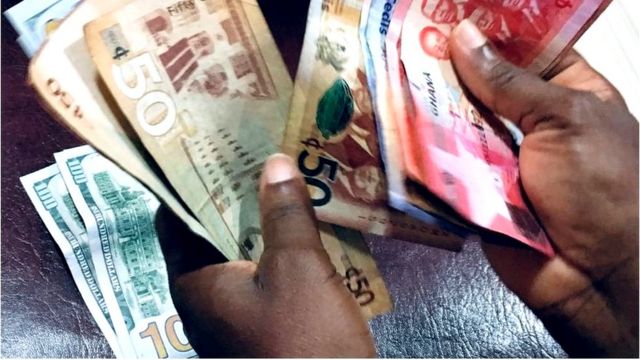The cedi, despite the current politically-tensed atmosphere and Christmas festivities has remained relatively stable against the dollar and other major trading currencies.
Figures from the Bank of Ghana (BoG) indicate that the cedi had depreciated marginally by 0.1 per cent against the greenback now reaching a year-to-date depreciation rate of 3.2 per cent with a monetary value of Ghs 5.71 per $1 as at December 18.
The 3.2 new depreciation rate is from a previous year-to-date depreciation rate of 3.1 in November, 2020.
The NDC’s rejection of the presidential results declared by the Electoral Commission (EC) coupled with series of protests by its supporters in various parts of the country, usually presents a situation that puts investors on a red alert and sometimes triggers unplanned capital flight, thereby putting extra pressure on the cedi and weakening its strength.
Besides that, characteristic ahead of every Christmas season, the cedi again comes under severe pressure as there is high demand for the dollar by importers leading to a sharp depreciation.
An instance, was when the cedi in November and December 2019, depreciated against the dollar by 12.8 percent and 12.9 percent respectively ahead of the Christmas festivities.
The situation is however, different this year as despite the odds, the cedi has only depreciated roughly by 0.1 per cent from the beginning of December this year.
But the low depreciation rate among others can be attributed to low imports for the festivities which is influenced by trade restrictions imposed by countries around the globe on the back of the Covid-19 pandemic thereby resulting in less demand for the dollar which would have weakened the cedi.
Commenting on this, an analyst with Databank Research, Courage Martey, credited the Bank of Ghana’s FX measures as the main contributing factor to the currency’s relative stability.
He said the central bank’s bi-weekly FX auctions, strong reserve position, improved regulatory oversight and keeping the policy rate stable, are all responsible for the cedi’s relative stability.
The economy’s gross international reserves as of October this year was GH¢8.6 billion, which represents four months of import cover according to data from the Bank of Ghana.
“A number of things have contributed to stability of the cedi during the course of this year. First is the bi-weekly forex forward auction introduced by the Bank of Ghana. Basically, what the FX auction does is ensure the cedi is sold forward without an exchange of dollars. So, a price is agreed without any physical exchange of dollars. This has drastically reduced speculation and hoarding of the dollar. And during the course of the year, the central bank has built enough reserves despite difficulties in the global financial market,” he said.
He added: “What we have also seen is that there is increased regulatory oversight. So, if you are a multinational, your profit repatriation is now being monitored. All these have contributed to stability of the cedi during the course of the year. Then, also, the Bank of Ghana has learned to use interest rates as a means to attract capital away from demand for dollars. So, now, investors consider how much they will earn from Treasury bills compared to how much they will earn as a result of the cedi depreciating against the dollar.”
Asked whether he thinks the current political stand-off could negatively affect the cedi’s stability, Mr. Martey said: “We cannot completely rule that possibility out, but I don’t see it affecting stability of the currency that much. My reasoning is that despite the misunderstanding, Ghana has proven to be a state governed by rule of law and the investors understand that. They know that in the worst-case scenario the matter will be taken to court and it will be resolved. The worst I expect is that capital may not flow in as expected, but I don’t expect any massive outflow of foreign capital,” he emphasized.








